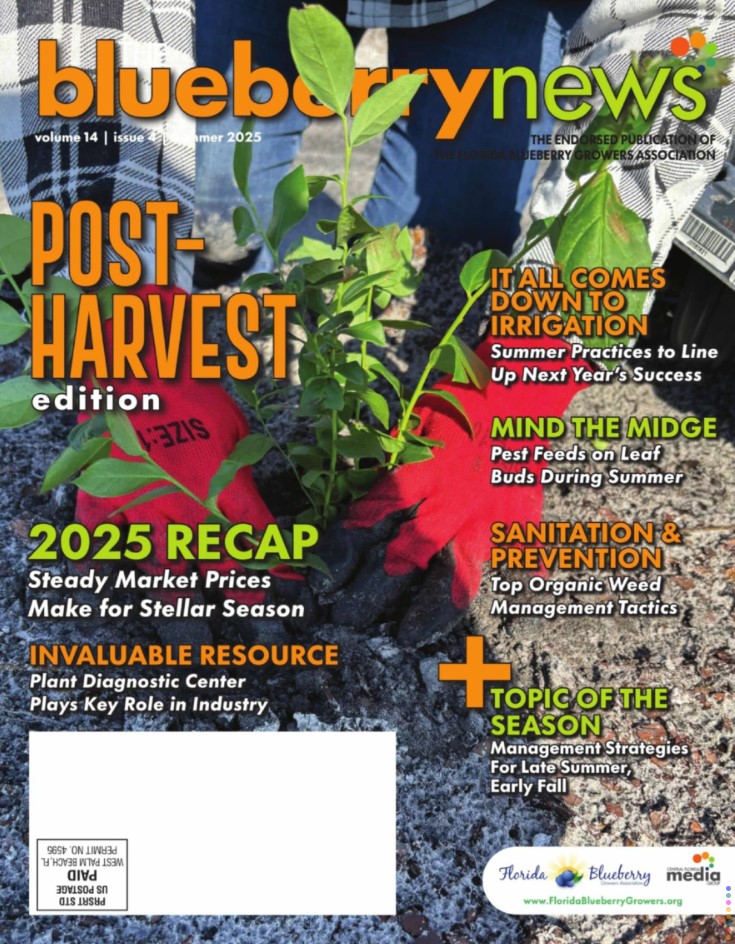Blueberry Advisory System a Web Based Tool for Timing Anthracnose Fruit Rot Controls
The Blueberry Advisory System (BAS) is a weather-based alert system that signals Florida blueberry growers when environmental conditions are favorable for the development of anthracnose fruit rot (AFR). The BAS is currently available in a beta form, but will be formally released early next year following programming changes and push notification setup. The data for AFR risk models is collected from the Florida Automated Weather Network (FAWN), which has weather stations throughout the state. The risk for AFR development is rated as low, moderate, or high (Figure 1), and growers who sign up for notifications following the formal release will receive a text message when the risk is moderate or high. This system allows growers to target their fungicide sprays to those periods when the development of infection is more likely, in many cases decreasing overall applications for the season while achieving a comparable level of disease control. Growers can also use these risk assessments to choose whether to use a less expensive fungicide (such as Captan) when disease risk is moderate, or a more expensive product that may have greater efficacy during periods of high risk. The beta version of this tool can be accessed at http://agroclimate.org/tools/bas/. The “A” portion of the symbols in Figure 1 are the risk ratings for AFR. Note that the formal version of BAS will only address AFR and not Botrytis, which is the “B” portion of the symbols.
Figure 1. Blueberry Advisory System disease risk rating.
Credits: AgroClimate
AFR, also called ripe rot, is a fungal disease that can damage blueberry fruit, resulting in sunken lesions, softening, shriveling, and rotting of berries, along with eruptions of salmon-orange masses of spores (Figures 2 and 3). Symptoms typically start at the blossom end of the berry and cause the fruit to be unmarketable, affecting pack-out percentages and grower revenues. Fungal pathogens in the genus Colletotrichum can cause AFR infections as early as bloom, with symptoms often not appearing until the fruit ripens or after it has been harvested and stored. Warm, wet weather is conducive to the development of AFR, with temperatures between 59-81°F (15-27°C) and leaf wetness duration of more than 12 hours the most favorable for infection. In addition, rainfall or overhead irrigation disperses the pathogen to uninfected fruit and plants, creating additional opportunities for infection. The pathogen can also be spread by fruit-to-fruit contact, harvesting machinery, and sorting equipment.
Figure 2. AFR damage on blueberry
Credits: Bruce Watt, University of Maine, Bugwood.org
Figure 3. Colletotrichum sporulation on blueberry
Credits: M. Velez-Climent.
Control of this disease depends primarily on protective fungicide applications, which many blueberry growers apply using a calendar-based method. Under this method, fungicide applications are made at regular intervals during fruit development, often every 14-21 days, which over the course of a season can be a significant cost.
In field trials on nine blueberry farms over the 2018-2019 seasons, the BAS was shown to provide comparable levels of AFR control in most cases (when conditions were favorable for AFR development) with fewer fungicide applications compared to existing grower practices.
Fungicides suggested for use in a rotation to control AFR include Switch® (cyprodinil + fludioxonil), Captan, and Omega® (fluazinam). AFR in Florida has shown resistance to Abound® (azoxystrobin) and the boscalid component in Pristine® (pyraclostrobin + boscalid).
Good cultural practices can also help reduce the risk of developing AFR, including periodic pruning to open the canopy to increase airflow and drying, using drip or microjet irrigation instead of overhead irrigation (or timing overhead irrigation to minimize leaf and fruit wetness duration), harvesting frequently to avoid overripe berries, and rapid cooling of fruit following harvest.
by DOUG PHILLIPS, UF/IFAS Blueberry Extension Coordinator





